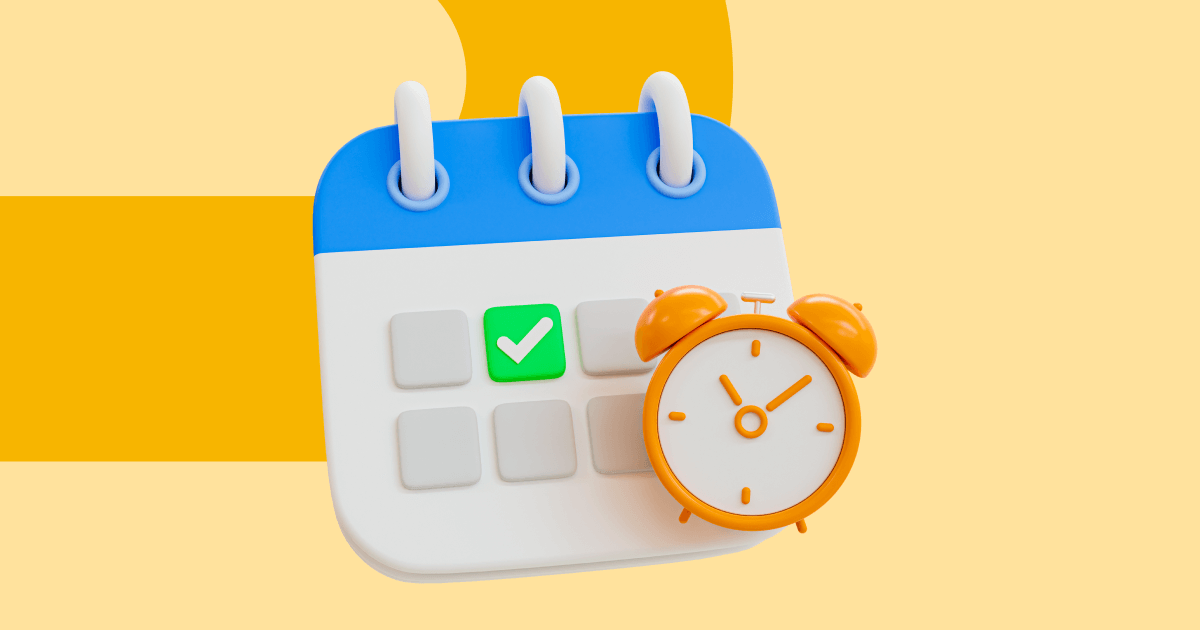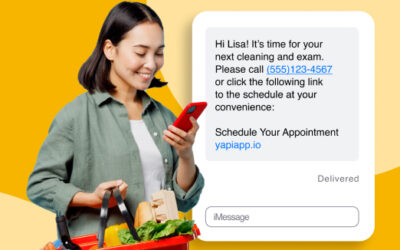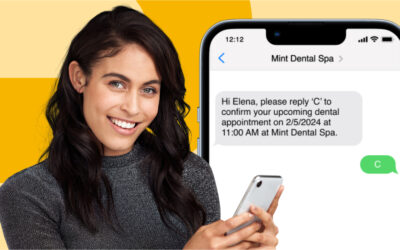
Sending dental appointment reminders is an integral part of any successful dental practice. In addition, appointment reminders ensure that patients attend their scheduled treatment.
Studies show sending SMS reminders helps reduce missed appointments and no-shows from 31% to 14%.
In addition, it helps to maximize the efficiency of your practice, and experts even estimate patient retention rates to reach around 85% to 95%.
However, sending these reminders at the right time for effective communication is essential to keep the appointment on top of your patient’s mind.
The right frequency of dental reminders depends on your practice’s specific needs and patient preferences.
However, it must give patients enough time to make necessary adjustments or cancellations. Your dental staff must also get enough time to reschedule and refill the practice calendar.
This article discusses the best times for sending dental appointment reminders. We will understand how to pick the right frequency to send reminders that get the best response from your dental patients.
What is the Ideal Frequency for Sending Dental Appointment Reminders?
The purpose of dental appointment reminders is to ensure patients remember their visit date.
According to the American Dental Association, reminders are helpful for pre-visit engagement of busy patients, and the right frequency helps you avoid broken appointments and no-shows.
The ideal frequency of dental appointment reminders depends on the type of treatment the patient is undergoing and how soon it is scheduled. The Journal of Oral Hygiene & Health states that sending text message reminders ensures patients maintain oral hygiene and increases adherence to prescribed treatment.
Therefore, depending upon the frequency of reminders must be decided based on the patient’s treatment and visit date. A reminder a few days before a routine checkup is sufficient for regular checkups.
However, for more complex treatments requiring additional preparation, such as orthodontic procedures, patients may need to receive multiple reminders closer to their appointment date.
When deciding on a reminder frequency, consider sending more reminders to patients who need help remembering appointments or are less tech-savvy. You may also need to send additional notifications about fees and necessary paperwork to complete before a patient visit.
Reminder frequency varies for different modes of reminders like text or email.
Email reminders must be sent around two weeks before an appointment to increase the likeliness of it being opened and read.
Text reminders can be sent around two weeks before an appointment. It is helpful to remind busy patients.
It is also important to consider the content of the reminder. For example, text messages may be better for urgent reminders, and you can use emails to provide more detailed information.
With the right balance, you can ensure your appointment reminders are well-received and effective.
8 Best Times to Send Dental Appointment Reminders
Timing plays an essential role in sending reminders for dental appointments. You must ensure that your patients are aware of their upcoming appointments well in advance so they can plan accordingly and show up on time.
But the reminder must not be sent so early or far ahead that they forget about it.
The best practices for sending dental appointment reminders with an appropriate frequency are:
-
Save the Date Reminder
Send a ‘Save the Date Reminder’ when booking the appointment and request them to visit on time. You must provide the patient with a confirmation of their appointment over their email.
In the same email, request your patients to set a reminder by providing the ‘Add to Calendar’ option. It will help patients immediately save the appointment and plan their schedule accordingly.
You can also add a note that explains how regular check-ups and cleanings are key for maintaining a healthy smile.
-
Three Weeks
You must also send your patients a postcard or direct mail, as some of them may not be tech-savvy.
Sending a postcard reminder three weeks before the appointment date is an excellent way to ensure they turn up on time.
A postcard provides a tangible appointment reminder option. You can also include the dental office’s address and other details your patients might need. It is a gentle reminder that their appointment is coming up and keeps them from forgetting about it.
-
Two Weeks
You can send an email reminder as a gentle nudge two weeks before the scheduled appointment. It can include prescribed oral healthcare routines or special instructions that patients must follow before visiting the dental office.
An early email reminder also allows patients to make any necessary changes to their appointment dates or times. It can help ensure that all appointments are attended on time and give your office better control over the patient flow.
-
Four Days
You must start preparing for the treatment before the appointment date. Start by sending a follow-up email four days before the appointment to seek confirmation from your patients.
This email should also contain all the appointment details, including the date, time, and dental office address. If there are additional instructions for payment or documentation, add them to the email.
-
Three Days
You must receive confirmation from your patients before planning and preparing for their treatments. If you are still waiting to receive a response to your earlier reminders, text your patients three days before the appointment.
Studies show that 79% of patients receiving these reminders confirmed their appointments.
Once you get the confirmation, you can initiate the preparations at your dental office. It helps reduce patient wait times at the clinic and enhances their experience while ensuring optimal use of your resources.
-
Two Days
Some patients might be busy or unable to send an electronic confirmation. If there is no response or the appointment still needs to be confirmed, then make a phone call two days before the appointment. It ensures that your patient is aware of the appointment.
It allows them to discuss with your dental staff any queries they might have. They can also easily communicate in case there are any changes in plans. Additionally, it also helps your staff to create a connection with the patients.
-
One Day
You may choose to send a text reminder one day before the appointment so that your patient is prepared and on time. In addition, it helps you double-check your schedule. This reminder can include the appointment time and other essential information.
If pre-medication instructions are necessary for the upcoming treatment, you must include the details in the reminder. It eliminates their chances of forgetting the appointment and improves adherence to oral care.
-
Two Hours
Send a text message as an additional same-day reminder two hours before the scheduled time. It ensures the appointment is not forgotten or overlooked and eliminates the chances of no-shows and missed appointments.
A simple text reminder can be an effective way to keep clients on track and make sure they arrive on time and are prepared for their scheduled appointments. As a result, you can optimize waiting time at your clinic.
Using Software to Schedule Best Times Dental Appointment Reminders
Using dental appointment scheduling and reminder software makes setting up automated dental appointment reminders easier.
The software allows you to maintain a database of patient information and then send out reminders at pre-set times. It eliminates the need to manually set dates and times for sending reminders to each individual patient, saving your staff time and energy.
The software also allows you to customize messages for specific patients or groups of patients so that you can tailor your reminder notifications accordingly.
For example, if an elderly patient needs extra assistance getting around, you can create a special message with relevant details. You can also include promotional offers within the message, such as discounts for returning customers or rewards points for attending appointments regularly.
Yapi is an excellent tool for helping you streamline and automate patient reminder notifications so your staff can focus on better patient care and more important tasks.
By taking the stress out of appointment reminders, Yapi allows you to keep patients engaged and informed while increasing their chances of attending their appointments.
By default, Yapi sends out text reminders at 11 a.m. as it is the most effective time for patient communication, but it can be customized on the platform.
For example, data from dental practices using Yapi shows good patient engagement when sending messages between morning and lunchtime.
However, we still recommend you customize the timings and frequency based on the requirements of your dental practice and the action needed from the patient.
Similarly, by default, Yapi email reminders go out at the end of the day. You can even customize their timings to suit your patient preferences.
Both email and text reminders can also be personalized with the patient’s name and other information, such as their next appointment time. It helps keep communication clear and easy to comprehend, boosting customer satisfaction and loyalty.
Final Thoughts
Dental appointment reminders are an effective way to reduce patient no-shows and missed appointments.
In addition, they provide an excellent opportunity for dental practices to personalize the communication process with patients.
Sending out timely dental appointment reminders is beneficial for both patients and practices. Patients are aware of their schedule and will not forget the date or time. For dental practices, reminders help improve dental office productivity by reducing missed appointments.
However, there is no one-size-fits-all approach to sending appointment reminders. The key is finding the right balance between timing and frequency to maximize your reminders’ effectiveness.
Using an automated reminder system makes it easy to customize messages and send them at optimal times for better engagement. It ultimately leads to improved customer satisfaction and retention rates for dental practices.
Yapi’s automated appointment reminders help reduce no-shows, increasing patient engagement and better returns for your practice.
With Yapi, you will have a worry-free way of ensuring that your patients are reminded about their upcoming appointments. Try Yapi today and see how it can help make your clinic run smoother.


